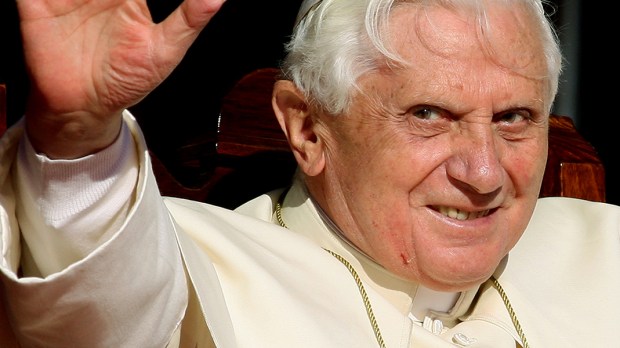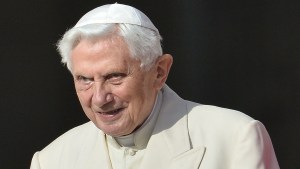Pope Emeritus Benedict XVI — Joseph Alois Ratzinger — has died.
Vatican spokesman Matteo Bruni announced the former pope’s death shortly after his death at 9:34 a.m. on December 31.
The 95-year-old pontiff passed away in the Vatican’s Mater Ecclesiae Monastery, where he has lived for most of the past nine years, since his historic resignation from the papacy.
Since Wednesday, December 28, when Pope Francis announced to the world that the Pope Emeritus was “very ill,” the Church has been united in prayer. His health stabilized in the coming days, but due to his advanced age, his condition was considered serious. He was able to participate in Mass on Friday, December 30, celebrated in his room in the monastery. He received Anointing of the Sick on December 28.
Already at peace
In February 2022, the Pope Emeritus alluded to his coming death, indicating that he was at peace.
“Quite soon, I shall find myself before the final judge of my life,” Pope Benedict wrote in a letter. “Even though, as I look back on my long life, I can have great reason for fear and trembling, I am nonetheless of good cheer, for I trust firmly that the Lord is not only the just judge, but also the friend and brother who himself has already suffered for my shortcomings, and is thus also my advocate, my ‘Paraclete.’ In light of the hour of judgment, the grace of being a Christian becomes all the more clear to me. It grants me knowledge, and indeed friendship, with the judge of my life, and thus allows me to pass confidently through the dark door of death.”
He remained active until the last. In October 2022, he penned a letter to the Annual Conference of the Joseph Ratzinger/Pope Benedict XVI Vatican Foundation, which took place at Franciscan University of Steubenville in Ohio. The letter characterized the Second Vatican Council as “not only meaningful, but necessary.”
His last trip abroad had been in June 2020, when he went to see his ailing older brother in Germany, Msgr. Georg Ratzinger. Msgr. Ratzinger died July 1, 2020, at the age of 96.
A first in centuries
Benedict’s death marks the first time in six centuries that a Successor of St. Peter has died while not in office. The last was Pope Gregory XII.
Although the world’s cardinals will not be traveling to the Vatican for a conclave to elect a successor, many are expected to stream into the Eternal City to bid farewell.
Both within and without the Church, Benedict XVI was recognized as a towering intellect, and a gracious man.
“Joseph Ratzinger will be remembered as one of the truly great Christian minds of the past 100 years; a man who combined faith and reason with elegance and clarity of expression to an extraordinary degree, yet radiated personal humility throughout his life,” Archbishop Emeritus Charles J. Chaput, O.F.M. Cap., of Philadelphia, told Aleteia. “He was the theological partner to Karol Wojtyla’s philosophical genius and a loyal son of Vatican II and its task of authentic reform.”
A future Doctor of the Church
Several Catholic intellectuals predicted that Benedict will one day be declared a Doctor of the Church.
“I don’t believe being pope is a proof of sanctity, nor is it sufficient grounds for canonization. But being Joseph Ratzinger is,” said Jesuit Fr. Joseph Fessio, founder and editor of Ignatius Press, whose doctorate was directed by Professor Joseph Ratzinger at the University of Regensburg. “I don’t know anyone who has worked closely with him who does not recognize his holiness and his brilliance. In addition to hoping for santo subito, I look forward to his being declared a Doctor of the Church.”
Father D. Vincent Twomey, SVD, Professor Emeritus of Theology at St. Patrick’s Pontifical University, Maynooth, Ireland, also a former doctoral student of Ratzinger’s, said Benedict will be remembered “above all for his literary and scholarly output. His writings on a vast spectrum of theological and philosophical topics have a clarity and a depth that make his theology inspiring and therefore liberating,” said Fr. Twomey. “His theology also stimulates further scholarly research, since all he could ever do was sketch the contours of the truth. Future generations of all walks of life will find inspiration in his homilies and in his pastoral writings as pope; his encyclicals on love and hope must rank among the most outstanding ever to come from the pen of a pope.”
Robert Royal, president of the Faith & Reason Institute, commented that Benedict’s death “marks the end of a monumental life that changed the Church — and the world — and will continue to do so for many years to come. In his brilliance, imagination, humility and steady faith, he resembled the Church Fathers, whom he loved and studied and brought to bear on our troubled age. He belongs in their company and should be named a Doctor of the Church. God grant him the eternal reward that he so richly merits.”
Dr. Peter Kreeft, professor of philosophy at Boston College and author of Wisdom From the Psalms, called Benedict a “gift of God, one of the very best teachers we have ever had, an equal to Gregory the Great, Leo the Great, and Leo XIII. A shoo-in for saint and eventually a Doctor of the Church.”
Mark Brumley, president of Ignatius Press, which has published the English translations of many of Pope Benedict’s books, said that along with Pope John Paul II, Benedict “served the Lord and his people mightily by helping the Catholic Church faithfully embrace reform in continuity, rather than either radical rupture or an uncritical return to the past. He was a major force for evangelical fidelity and engagement with the modern world.”
George Weigel, distinguished senior fellow and William E. Simon Chair in Catholic Studies at the Ethics and Public Policy Center, said that Benedict was “one of the most creative Catholic theologians of modern times and arguably the greatest papal preacher since Pope St. Gregory the Great. In the more than 30 years I knew him and was in conversation with him, I found him to be a consummate Christian gentleman, a man of deep faith and sweet temper. It has been my privilege to have been taught by and to work with many brilliant men and women; no one I’ve ever met had a more lucid or orderly mind than Joseph Ratzinger. He believed that the truth of the Gospel was the truth of the world, and he bent every effort to help others understand that truth.”
Tim Gray, president of the Augustine Institute, said that Benedict “blessed the Church by exemplifying what faith seeking understanding looks like in postmodernity. Humbly complementing his friend and predecessor, Pope Saint John Paul the Great, he showed how the Second Vatican Council faithfully applied the Word of God and the gospel proclamation as the way for us to navigate the crisis of truth we now face. I particularly think his Encyclical Letter on Hope, ‘Spe Salvi,’ was prophetic. He spoke of the hope that challenges us to give up comfort in order to embrace the cross, striving forward for the hope Christ has stored up for us in heaven. I pray he may now realize the hope he cherished and the hope he challenged the Church to hold to above all others.”
World leaders react
US President Joe Biden, through the United States Ambassador to the Holy See, said that he and First Lady Jill Biden “join Pope Francis and all Catholic faithful around the world in mourning the loss of Pope Emeritus Benedict XVI.” Biden praised the “courage” and “conviction” of the German pope upon his election to the papacy in 2005, “as the world mourned the death of Pope Saint John Paul II.”
For Italian Prime Minister Giorgia Meloni, Benedict “was a giant of faith and reason.” In a tweet, she paid tribute to “the spiritual, cultural and intellectual depth of his magisterium.”
The death of Benedict XVI “is a mourning for Italy,” said Italian President Sergio Matarella, referring to the late pope’s “gentleness” and “wisdom,” as well as his “humility” and his “serenity” in his role as pope emeritus after his retirement. Matarella called him a figure “unforgettable for the Italian people,” who pleaded “for dialogue.”
For German Chancellor Olaf Scholz, “the world is losing a prominent figure in the Catholic Church, a combative personality and an intelligent theologian.”
The pope emeritus was “a great theologian dedicated to the service of others, justice and peace,” wrote the president of the Spanish government Pedro Sánchez.
The primate of the Anglican Church, the Archbishop of Canterbury Justin Welby, recognized Benedict as “one of the greatest theologians of his time, attached to the faith of the Church and faithful in his defense.”
“It was quite clear that Christ was the root of his thought and the foundation of his prayer,” Welby said in a statement, highlighting his “courageous and humble decision to resign from the papacy.”
Profound gratitude to the Lord
Archbishop Timothy P. Broglio of the Archdiocese for the Military Services, USA, and president of the U.S. Conference of Catholic Bishops, said that the pope emeritus’ passing “sounds contrasting notes of sorrow and gratitude in my heart.”
“The Church gives thanks for the treasured ministry of Pope Benedict XVI,” Archbishop Broglio said in a statement. “A superb theologian who lent his talents as a peritus at the Second Vatican Council, he continued throughout his long life to be an effective teacher of the faith. As a priest, university professor and theologian, archbishop, and cardinal, his voice in deepening an authentic understanding led all of us to a more profound love of truth and the mystery of God. It will take many years for us to delve more deeply into the wealth of learning that he has left us.
“Personally, I remember many meetings with him while I served in the Secretariat of State, and I will never forget his greeting to me at the first General Audience I attended some weeks after his election to the Chair of Peter. ‘Ci conosciamo‘ (we know each other) were his warm words of welcome as he took my hand between his.
“Generations will continue to be enriched by his books, discourses, and homilies. They all reveal a depth of learning and reflection that is essential both in our time and in the future.
“While we grieve that he is no longer with us here, I join Catholics everywhere in offering my profound gratitude to the Lord for the gift of Pope Benedict XVI and his ministry. Together we beg our Lord to grant him eternal rest.”
Aleteia will have much more coverage on Pope Benedict XVI’s life and legacy in the days to come.



